Key takeaways:
- Money laundering entails three steps: placement, layering, and integration, highlighting the complexity of disguising illegal funds.
- Corruption has a profound societal impact, leading to resource depletion, loss of public trust, and psychological disillusionment among communities.
- Implementing robust Know Your Customer (KYC) practices and leveraging advanced technology are crucial strategies in combatting money laundering.
- Personal advocacy can drive awareness and promote collective action against money laundering and its societal consequences.
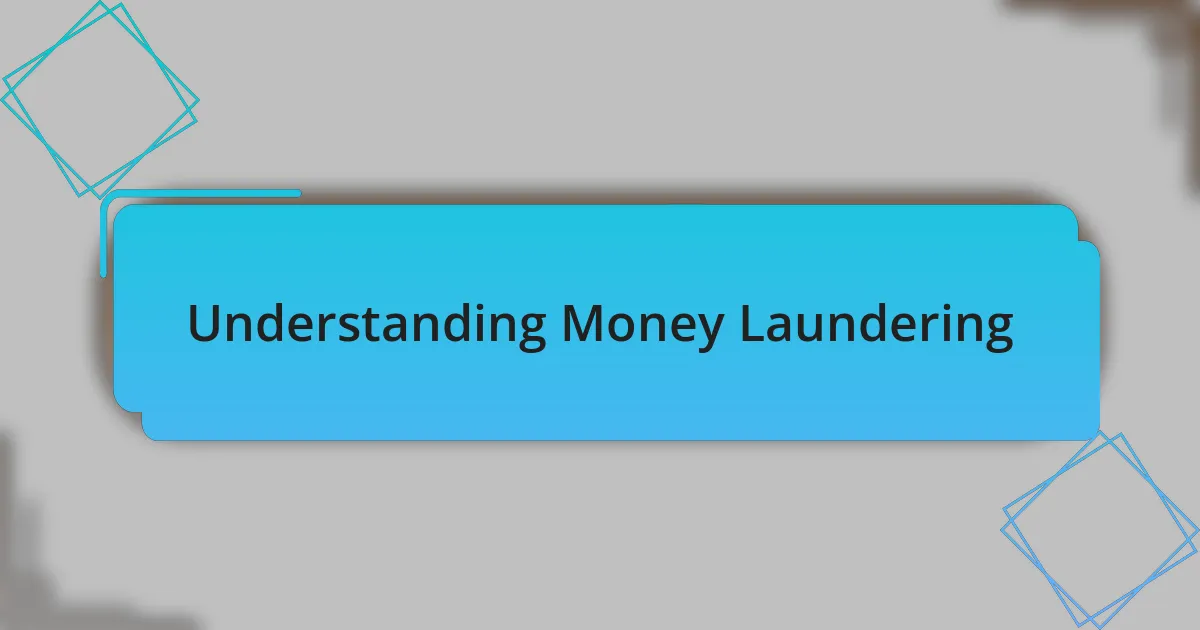
Understanding Money Laundering
Money laundering is essentially the process of making illegally obtained money appear legal. It’s fascinating and frightening to consider how organizations can manipulate complex financial systems to disguise their profits, isn’t it? In my experience studying this phenomenon, I’ve often wondered at the lengths people will go to, and the clever methods they employ to mask the origins of their wealth.
Take the three steps of money laundering: placement, layering, and integration. Each phase reveals how criminals try to obfuscate the illegal nature of their funds. Personally, I remember being struck by a case study where the individuals used shell companies—entities that exist only on paper—to transfer money. It made me think: how many innocent-looking businesses around us could potentially be fronts for more nefarious activities?
Understanding the motivations behind money laundering opens a window into the mindset of those involved. There’s a certain detachment in how easily individuals compartmentalize their actions to justify their unethical behavior. I often find myself contemplating the moral implications: how does one reconcile the pursuit of wealth with the destruction it can cause to society? This ongoing inner dialogue drives my passion for uncovering connections between corruption and these financial crimes.
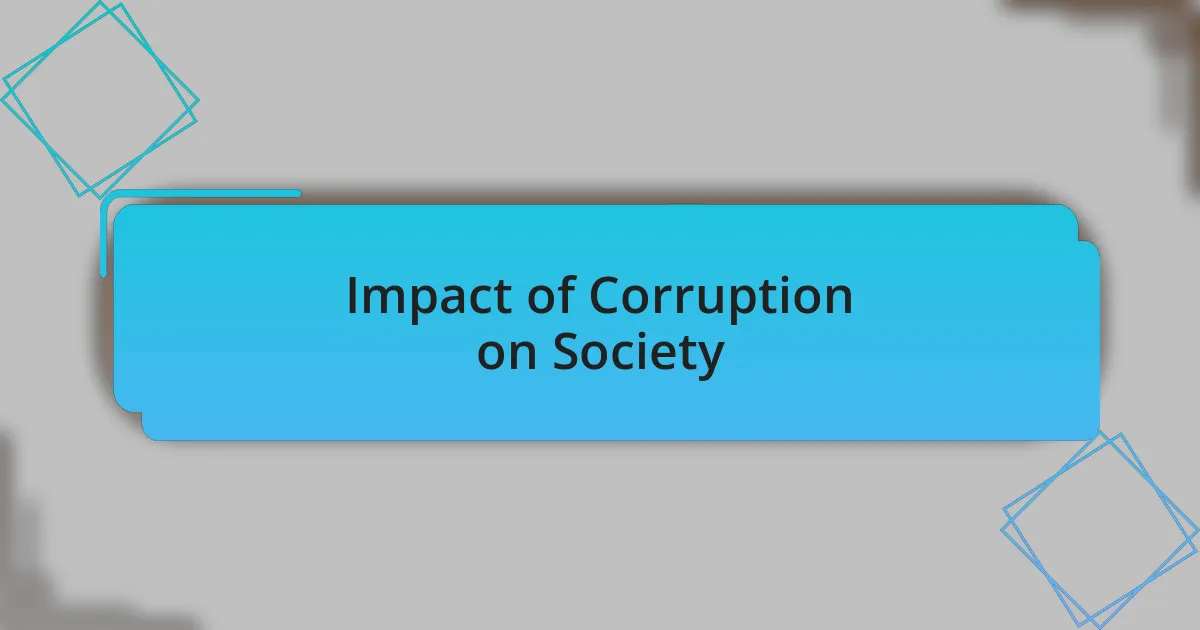
Impact of Corruption on Society
Corruption, particularly in the form of money laundering, can devastate communities by draining resources that could otherwise support public welfare. I recall a project I was involved in, where we examined how funds siphoned away from social services led to deteriorating healthcare access in a small town. It left me wondering: how many lives might have been improved if that money had been used for education or infrastructure instead?
When corruption pervades society, it triggers a cycle of mistrust. I still remember discussing with colleagues how the citizens of a corrupt environment often feel powerless, as their faith in institutions erodes. It raises an important question: how can we expect communities to thrive when the very systems meant to protect them are compromised?
Moreover, the psychological impact of corruption is profound. I’ve seen individuals become disillusioned, experiencing a range of emotions from anger to apathy. This creates a vicious cycle where people give up on seeking justice, believing it to be futile. It makes me reflect on the collective responsibility we share to combat this insidious issue, ensuring that integrity is not just a lofty ideal, but a lived reality for everyone.
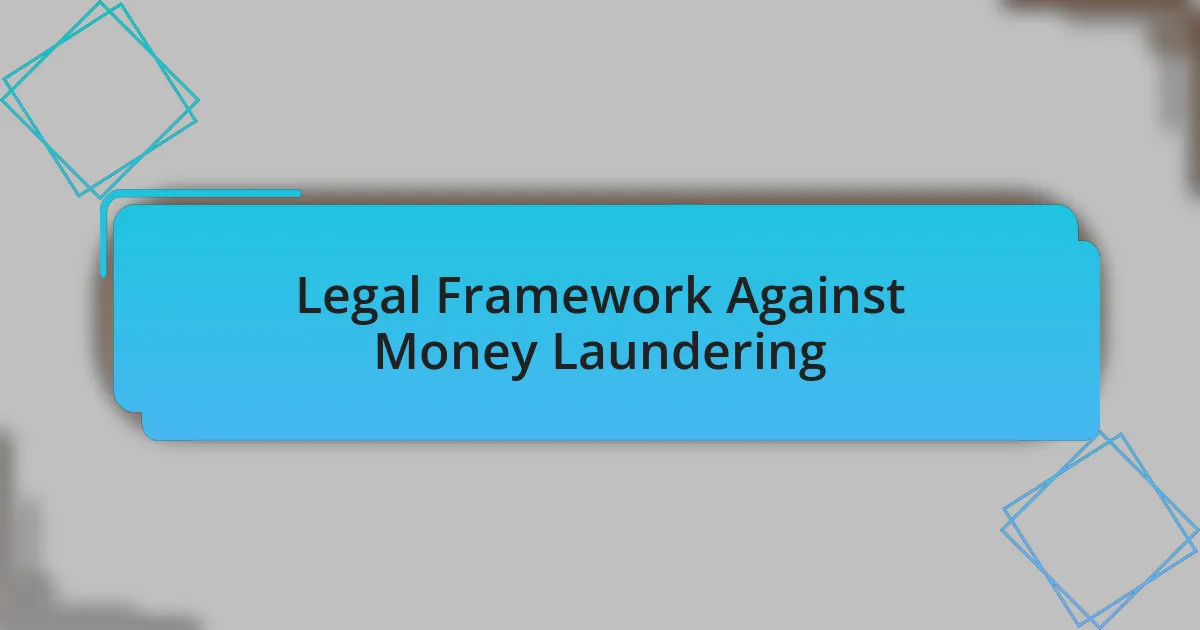
Legal Framework Against Money Laundering
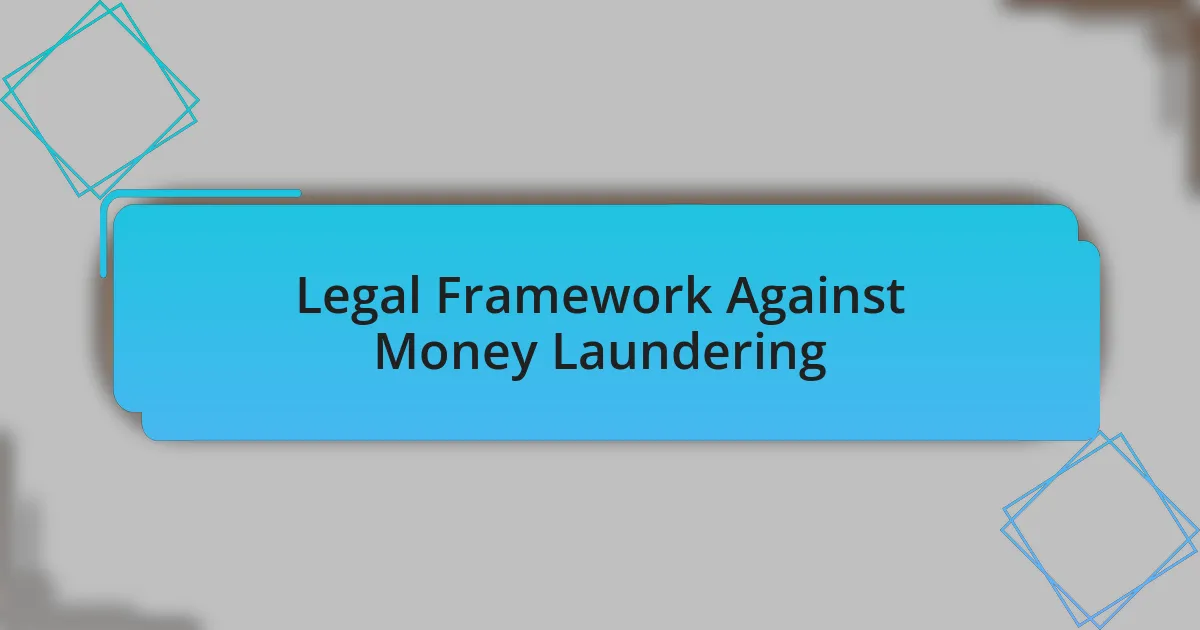
Legal Framework Against Money Laundering
Navigating the labyrinth of laws designed to combat money laundering can be quite intricate. From my experience working in compliance, I’ve seen firsthand how various nations establish frameworks that compel financial institutions to monitor and report suspicious transactions. It begs the question: are these measures effective enough to keep pace with the ever-evolving tactics of criminals?
In many countries, legislative bodies have enacted strict regulations, like the Bank Secrecy Act in the U.S. or the Anti-Money Laundering (AML) directives in the EU. These frameworks not only impose penalties on offenders but also require reporting entities to implement internal controls and regular audits. I often wonder if the costs associated with compliance deter smaller institutions from fully engaging in these protective measures.
Moreover, international cooperation is vital in this fight. Treaties and agreements, such as the FATF recommendations, aim to create a cohesive stance against money laundering globally. I’ve always believed that sharing intelligence between countries can dramatically enhance our ability to track illicit financial flows. If nations can unite over this issue, could we potentially see concrete results in disrupting money laundering networks?
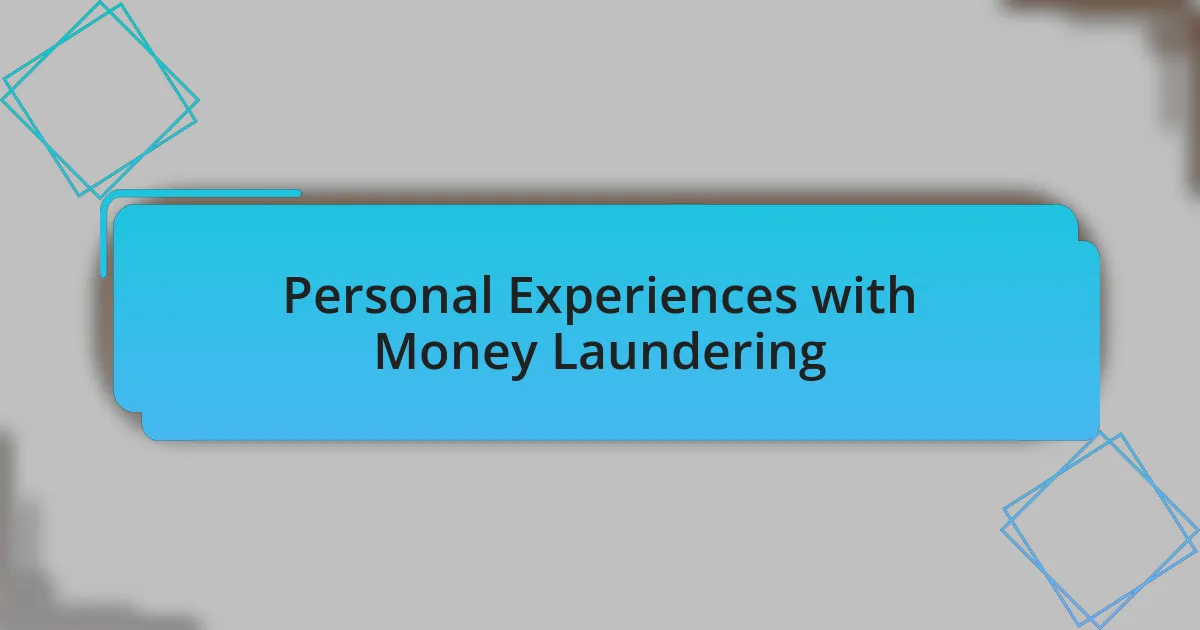
Personal Experiences with Money Laundering
Reflecting on my own encounters with money laundering, I recall a moment that truly shook me. I was involved in an investigation where we uncovered a massive network funneling illicit funds through seemingly legitimate businesses. It was a stark reminder of how the shadows of crime intertwine with the everyday world, and it left me questioning how many more instances lie hidden beneath the surface.
I remember a colleague sharing their experience with a major bank that unfortunately fell victim to a money laundering scheme. He described the frustration and helplessness of watching the institution’s reputation suffer as the media spotlight turned its glare on us. This taught me that the human toll of such activities extends beyond the perpetrators; it also affects countless innocent employees and customers.
One particular incident stands out, where a tip-off led to the freezing of accounts tied to suspicious activity. The tension in the office was palpable. It made me realize that while our systems can shield us, they aren’t foolproof. I often wonder: how many unreported cases are out there, with victims remaining unaware of their financial ties to criminal actions?

Lessons Learned from My Experience
One significant lesson I learned is the importance of vigilance in our work. There was a time when I overlooked small red flags during an audit, thinking they were just minor discrepancies. This lapse in attention cost us valuable time, allowing illicit activities to persist. It was a stark wake-up call for me; I realized that in the fight against money laundering, every detail matters. Have you ever experienced a moment where a tiny oversight led to bigger consequences? It made me appreciate that our instincts often sense things that the numbers alone cannot reveal.
Another lesson that resonated deeply was the necessity of fostering open communication among team members. I remember a colleague who, feeling uncertain about a project, hesitated to voice their concerns. It wasn’t until after we faced serious repercussions that we realized how vital it was to create an environment where everyone feels safe to speak up. That experience taught me that collaboration can illuminate potential issues before they grow too large to manage. How often do we overlook the voices of those around us, thinking it might complicate matters? I’ve found that encouraging dialogue can uncover insights we might not see alone.
Lastly, I encountered the crucial role of empathy in our profession. During one challenging case, I spoke with a victim who had unwittingly become entangled in a financial scheme. Their vulnerability and fear were palpable, and it struck me that they were not just numbers in a report; they were real people facing real consequences. This experience reinforced that our work impacts lives directly, pushing me to approach every case with compassion. Does it ever occur to you that understanding the human aspect can transform how we view our responsibilities? Connecting on a personal level has since guided my perspective, reminding me that behind each statistic lies a story.
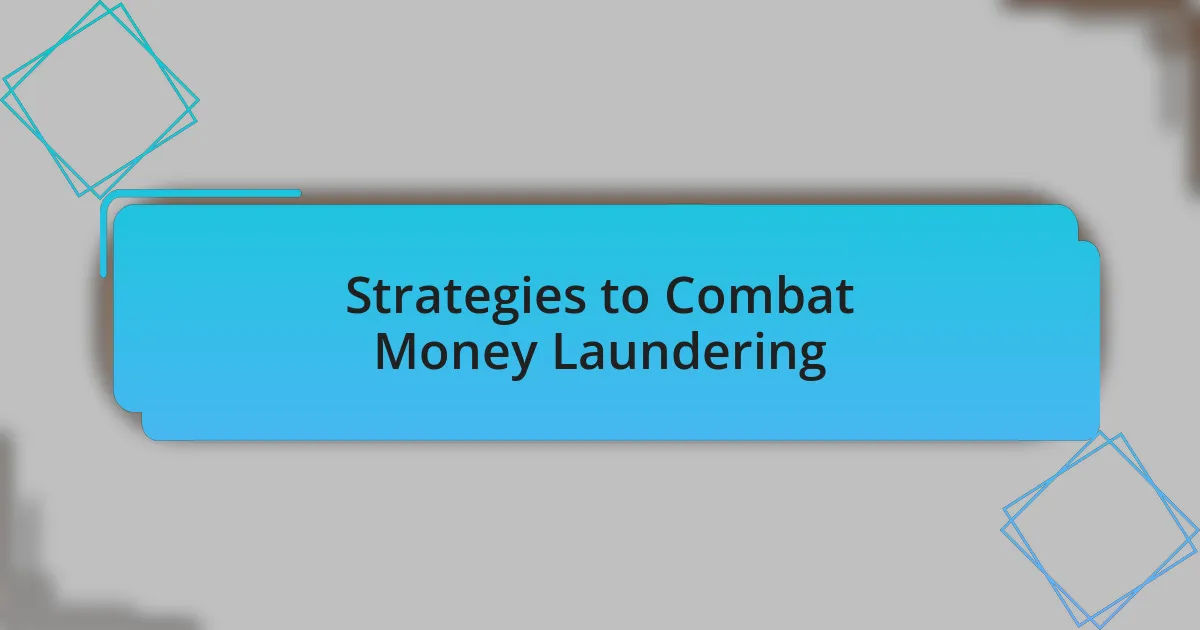
Strategies to Combat Money Laundering
One effective strategy to combat money laundering is the implementation of robust Know Your Customer (KYC) practices. I recall a time when our firm adopted a strict KYC policy, requiring comprehensive background checks on clients. This proactive approach not only protected us from potential fraud but also fostered transparency in our operations. Isn’t it fascinating how understanding our clients better can help us establish trust while safeguarding our resources?
Another avenue worth exploring is the integration of advanced technology to detect suspicious activities. I once participated in a project involving data analytics tools that could flag unusual transaction patterns in real-time. This not only streamlined our investigative process but created a culture of vigilance among our team. Have you considered how technology might transform the landscape of financial oversight? Embracing these innovations has made me realize that the future of compliance is not just about following rules—it’s about empowering ourselves with the right tools.
Lastly, establishing coordination among various regulatory bodies is crucial. I vividly remember a collaborative effort where several agencies came together for a task force to address cross-border money laundering. The synergy we achieved not only amplified our resources but also strengthened the overall response to financial crime. How often do we find that working together leads to more effective solutions? This experience underscored for me that in the fight against money laundering, unity can be our most powerful weapon.
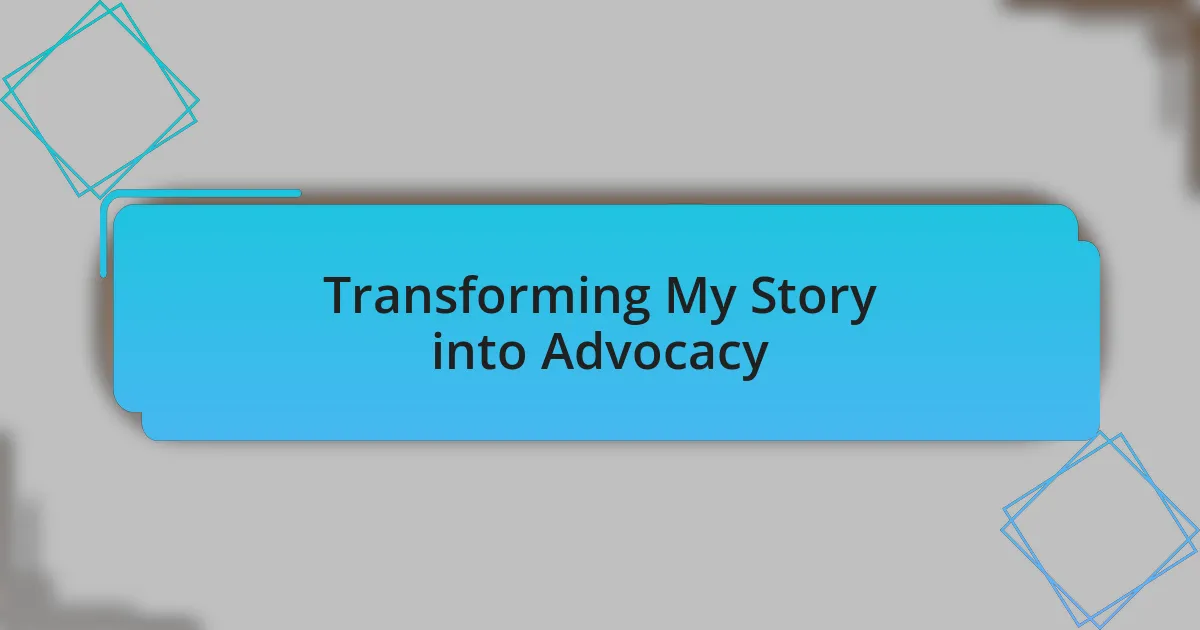
Transforming My Story into Advocacy
Transforming my experience into advocacy involves sharing lessons learned through exposure to money laundering practices. I remember the moment I realized how easily individuals could manipulate the financial system. It was unsettling to see firsthand the impact on communities, and I found myself driven to raise awareness about these issues. How can we remain silent when we have the potential to ignite change?
As I began sharing my story, I tapped into a sense of urgency that resonated with others. At a local community meeting, the fear and confusion surrounding financial crimes were palpable. It struck me that by vocalizing my journey, I was empowering others to engage in dialogue and take action. Have you ever witnessed a transformation sparked by a shared experience? Seeing people unite against corruption gives me hope.
The process of advocacy isn’t just about recounting my story; it’s about fostering a collective resolve. I’ve organized workshops, inviting experts to discuss money laundering and its ripple effects on society. Each session has reinforced my belief that together, we can build a more transparent financial world. Do you feel a responsibility to be part of this movement? I certainly do, and I encourage others to step forward as well.